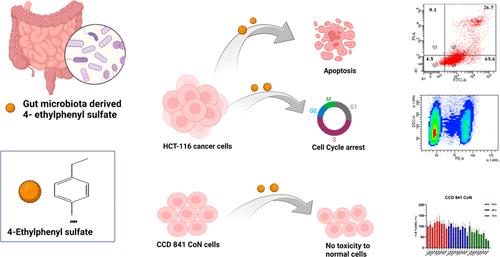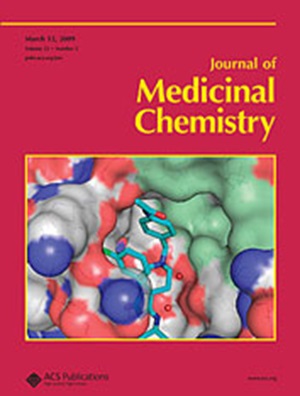Gut Microbial Metabolite 4-Ethylphenylsulfate Is Selectively Deleterious and Anticancer to Colon Cancer Cells
IF 6.8
1区 医学
Q1 CHEMISTRY, MEDICINAL
引用次数: 0
Abstract
Gut microbiota-derived metabolites have emerged as promising candidates in cancer therapeutics. Among these metabolites, 4-ethylphenyl sulfate (4-EPS), produced through dietary metabolism, is linked to chronic diseases but remains unexplored as a therapeutic agent for colorectal cancer (CRC) treatment. This study investigates the selective anticancer activity of 4-EPS using HCT-116 human colorectal adenocarcinoma cells and CCD 841 normal colon epithelial cells. Treatment with 4-EPS significantly reduced cell proliferation, viability, ATP levels, and colony-forming ability while increased apoptosis rate. Morphological changes included cell shrinkage, intracellular vesicle formation, and loss of membrane integrity. Mechanistically, 4-EPS upregulated Bax, downregulated Bcl2, and induced G2/M phase cell cycle arrest. In silico investigations revealed strong interactions with HDAC isoforms, suggesting epigenetic modulation. Markedly, 4-EPS treatment showed no deleterious effect on CCD 841 normal colon epithelial cells, which proved its selective anticancer role for colon cancer cells. These findings highlight 4-EPS as a promising therapeutic agent for treating CRC.

肠道微生物代谢物4-乙基苯基硫酸酯对结肠癌细胞具有选择性杀伤和抗癌作用
肠道微生物衍生代谢物已成为癌症治疗中有希望的候选者。在这些代谢物中,通过饮食代谢产生的4-乙基苯基硫酸盐(4-EPS)与慢性疾病有关,但作为结直肠癌(CRC)治疗的治疗剂仍未被探索。本研究利用HCT-116人结直肠癌细胞和CCD 841正常结肠上皮细胞研究4-EPS的选择性抗癌活性。4-EPS显著降低细胞增殖、活力、ATP水平和集落形成能力,同时增加细胞凋亡率。形态学改变包括细胞收缩、细胞内囊泡形成和膜完整性丧失。在机制上,4-EPS上调Bax,下调Bcl2,诱导G2/M期细胞周期阻滞。计算机研究显示与HDAC异构体有很强的相互作用,提示表观遗传调节。4-EPS对CCD 841正常结肠上皮细胞无明显杀伤作用,证明了其对结肠癌细胞的选择性抗癌作用。这些发现突出了4-EPS作为治疗结直肠癌的一种有前景的治疗剂。
本文章由计算机程序翻译,如有差异,请以英文原文为准。
求助全文
约1分钟内获得全文
求助全文
来源期刊

Journal of Medicinal Chemistry
医学-医药化学
CiteScore
4.00
自引率
11.00%
发文量
804
审稿时长
1.9 months
期刊介绍:
The Journal of Medicinal Chemistry is a prestigious biweekly peer-reviewed publication that focuses on the multifaceted field of medicinal chemistry. Since its inception in 1959 as the Journal of Medicinal and Pharmaceutical Chemistry, it has evolved to become a cornerstone in the dissemination of research findings related to the design, synthesis, and development of therapeutic agents.
The Journal of Medicinal Chemistry is recognized for its significant impact in the scientific community, as evidenced by its 2022 impact factor of 7.3. This metric reflects the journal's influence and the importance of its content in shaping the future of drug discovery and development. The journal serves as a vital resource for chemists, pharmacologists, and other researchers interested in the molecular mechanisms of drug action and the optimization of therapeutic compounds.
 求助内容:
求助内容: 应助结果提醒方式:
应助结果提醒方式:


